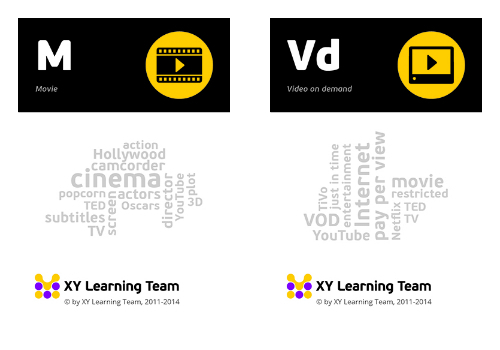A Different Approach: Movie-Based Learning
Let's accept it! It is a daunting task to effortlessly attract learners in the classroom. Most of my industry colleagues lament about how challenging it is to make learning programs attractive with the clichéd design of games, activities, role-plays, and inventories. Online programs pose a similar dilemma. For example, learners browse through a series of modules on autopilot in silos while technical analytics deliver "engagement levels" to the author or administrator in numerical format. Although I opine this based on my experience and conversations with my fraternity, I do not discount the effectiveness of any learning engagement. As a curator and advocate of learning strategies, I have facilitated diverse learning methodologies and seen remarkable results in productivity. But what if we could turn the tables and entice our learners through a diverse method? Play movies. Yes, that's correct: movie-based learning.
We all love movies. They arouse thousands of emotions through their larger than life experiences. Movies leave a mark on the human psyche, they allow viewers to encounter a multitude of situations and possibilities that are coupled with tragic moments and coping abilities. Movies with several genres alter our perceptions about the world around us and give meaningful insights. Hence, movies in a way are a great learning method to develop diverse skill-sets. If organizations desire to develop or enhance the cognitive capacities of their workforce, then exposing them to situations that allow them to expand their rational and emotional aspects of the brain must be emphasized. The right choice of narratives churn out the logical and emotional reasoning capabilities and influence aspects of risk-taking, problem-solving, decision-making, sustaining relationships, and many more.
Genres To Use For Movie-Based Learning
Here is my take on 7 genres that can bring about a transformational approach to people-development plans.
1. Book Adaptations
Accused of being called a bookworm? How about some community learning? Do you have a lack of interest in reading? How about watching a movie?
I endorse book adaptations for learning endeavors. They bring out the key aspects of the narrative through an emotional bent. Protagonists from the book are brought to life through the careful examination of talent and they will deliver the message in a compelling way. I recommend book adaptations for developing perceptual insight and understanding human psychology.
2. Biographies
Biographies take us on a journey. An arduous journey that is laden with trials and a series of misfortunes. The insights into the ebb and flow of the protagonist's life coupled with euphoric endings infuse inspiration and a belief that nothing is impossible. I recommend biographies to develop the value of patience, visionary traits, strategy, ownership and accountability, and self-leadership in trying times.
3. Documentaries
Documentaries bring truth to life. The genre inspires a journey to explore the fine line between fact and fiction. Documentaries enhance analytical capabilities, persistence, critical thinking, build curiosity and probing capacities. These competencies enhance business capabilities where sharp focus and investigative abilities are needed the most.
4. Science Fiction
The world of science fiction is a different platform. They inspire us to look beyond the predictable elements of existence and charter unexplored realms. Although the perception of science fiction is meant primarily for the juvenile population, a lot of takeaways for adult learners rest in strategy development, out-of-the-box thinking, creativity, and the flexibility and adaptability of diverse methods to produce meaningful work.
6. Drama
Dramas are highly associated with emotions. Dramas inspire novel thoughts and character development through multiple situations. The plot can come in various forms, ranging from crime, romance, thriller, emotional struggles, or relationships. Key competencies that one can develop are communication, listening, teamwork, collaboration, understanding the value of friendships and time, and many more.
7. Comedy
Comedy genres are a getaway from the stresses of daily existence. Comedy movies teach us how to have fun and lighten up in the company of people around us. Although binge-watching Friends might be the obvious choice, many movies out there help us understand when to put on our work hat and when to take it off. Comedy movies allow us to manage stress, collaborate well, enhance confidence, build a sense of self and self-worth.
Here are a few of my movie recommendations that can make a world of difference to the way learning can be made more engaging.
- Pride and Prejudice: communication, mutual respect, compassion
- The Danish Girl: acceptance, diversity, inclusivity
- Eat Pray Love: self-esteem, self-worth, self-direction
- Forrest Gump: self-awareness, empathy, listening
- The Book Thief: problem analysis, timing, vulnerability
- The Help: inclusivity, persistence, confidence
- Life of Pi: self-starting ability, strategy, problem-solving
- The Pursuit of Happyness: persistence, motivation, resilience
- The Two Popes: communication, collaboration, conflict management
- Argo: strategy, teamwork, persistence
- Hidden Figures: personal drive, freedom from prejudice, empathy
- A Beautiful Mind: persistence, goal-orientated, self-discipline
- The Walk: goal-oriented, versatility, self-starting ability
- Goal! The Dream Begins: persistence, diligence, self-esteem
- The King’s Speech: coaching, feedback, mentorship
- Miss Potter: creativity, sensitivity toward others, listening
- Everest: persistence, goal-oriented, teamwork
- Steve Jobs: strategy, results-driven, quality-oriented
- Victoria and Abdul: friendship, trust, respect
- 12 Angry Men: negotiation skills, collaboration, analytical thinking
- The Gifted: a sense of belonging, ownership, and accountability
- The Intern: honesty, integrity, problem management
- Ferdinand: friendship, positive attitude, sense of belonging
- Inside Out: self-awareness, emotional intelligence, emotional resilience
How To Organize Movie-Based Learning
- Choose a genre and the movie.
- Set expectations with the audience for the purpose of the screening. They need to know there is more to it than fun.
- Create study worksheets for each learner with questions and reflections about the movie.
- Ensure worksheets include questions about what they would do if they were the protagonists.
- Encourage them to read the sheets before the movie is played and share observations after the movie.
- Give them sufficient time to analyze and come up with their perspectives on the worksheet.
- Facilitate discussions around the relevance of the movie to their everyday roles.
- Solicit responses on how they could relate these observations to their own job roles.
- Check to see if the movie has met the expectations of the program.
Movies can be a great source of learning and encouragement. This methodology is an apt getaway for learners, and it offers learners a different environment and a different way to deal with a diverse array of situations. So, try this method and take a different approach to make learning journeys interesting.









